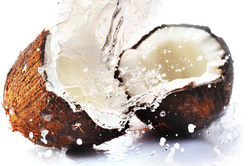 Lisa Donaldson APD Facebook went nuts this week with a battle over coconut oil spurred on by Chef Pete Evans. The Paleo community was cheering for its benefits, while the Dietitians Association of Australia warned of the high levels of saturated fat. As a dietitian who promotes ‘eating close to nature’, I thought I’d sit down this week and wade through the science and research to find some sort of common ground. Firstly, let’s take a closer look at this supposed ‘bad guy’ known as saturated fat. Coconut oil is about 90% saturated fat, which is a higher percentage than butter (64% saturated fat), beef fat or lard (40%). Typically, too much saturated fat in the diet is unhealthy because it raises 'bad' LDL cholesterol levels, which unfortunately increases the risk of heart disease. BUT that’s where we need to stop and reconsider grouping all saturated fats together, because we need to acknowledge that not all saturated fats are the same. What's distinctive about coconut oil is that it also gives rise to the good HDL cholesterol. Coconut oil is extremely rich in a saturated fat called lauric acid. Unlike the longer chain saturated fats, lauric acid has a positive effect on blood cholesterol profiles. Coconut oil also has small levels of medium-chain saturated fats and the body is able to breakdown these fats as fuel more easily than long chain saturated fats. BUT does that make it OK to add spoonfuls to your smoothies or to deep-fry your potato chips in it? Put simply, is coconut oil some sort of fat-burning superfood? No. What we need to keep in mind is that coconut oil, like any other fat, is extremely high in calories. Along with high energy levels, there are virtually no vitamins and minerals in coconut oil and the antioxidant compounds are inferior to the levels you would find in extra virgin olive oil. In terms of research, there are no long-term population studies to examine its effect on cholesterol levels over time, nor is there solid evidence to explain how coconut oil affects heart health/disease. At this time, the lack of research and the current science fails to convince me it is a ‘superfood’. Sure, coconut oil's distinctive HDL boosting effect certainly makes it a better choice than butter or lard, but it’s still not the best choice amongst a range of oils that have been proven to reduce the risk of heart disease. If you love how it makes your Asian dishes taste or how it works in raw fudge, have a little for that delicious flavor. What you need to keep in mind is that it’s not a miraculous cure for your heart, nor is it going to get you lean. It is however delicious and should be consumed in sensible portions and be neither revered or feared. My final recommendation? Eat your coconut as a whole food, enjoy the taste and gain benefit from the awesome fibre it contains… As for the oil, use small amounts for the flavor rather than the health benefits.
0 Comments
|
News FEEDFitness, Energy, Education & Diet Archives
June 2020
Categories
All
|
 RSS Feed
RSS Feed